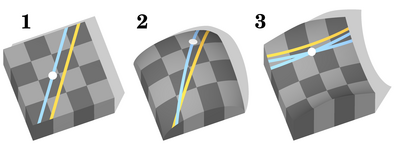
In mathematical logic, independence is the unprovability of a sentence from other sentences.
A sentence σ is independent of a given first-order theory T if T neither proves nor refutes σ; that is, it is impossible to prove σ from T, and it is also impossible to prove from T that σ is false. Sometimes, σ is said (synonymously) to be undecidable from T; this is not the same meaning of "decidability" as in a decision problem.
A theory T is independent if each axiom in T is not provable from the remaining axioms in T. A theory for which there is an independent set of axioms is independently axiomatizable.
YouTube Encyclopedic
-
1/3Views:2 731240 1021 921 339
-
Mathematical Logic: Mathematics in the Modern World (Tagalized)
-
Mathematics and Logic: From Euclid to Modern Geometry | Online Courses Trailer
-
The paradox at the heart of mathematics: Gödel's Incompleteness Theorem - Marcus du Sautoy
Transcription
Usage note
Some authors say that σ is independent of T when T simply cannot prove σ, and do not necessarily assert by this that T cannot refute σ. These authors will sometimes say "σ is independent of and consistent with T" to indicate that T can neither prove nor refute σ.
Independence results in set theory
Many interesting statements in set theory are independent of Zermelo–Fraenkel set theory (ZF). The following statements in set theory are known to be independent of ZF, under the assumption that ZF is consistent:
- The axiom of choice
- The continuum hypothesis and the generalized continuum hypothesis
- The Suslin conjecture
The following statements (none of which have been proved false) cannot be proved in ZFC (the Zermelo–Fraenkel set theory plus the axiom of choice) to be independent of ZFC, under the added hypothesis that ZFC is consistent.
- The existence of strongly inaccessible cardinals
- The existence of large cardinals
- The non-existence of Kurepa trees
The following statements are inconsistent with the axiom of choice, and therefore with ZFC. However they are probably independent of ZF, in a corresponding sense to the above: They cannot be proved in ZF, and few working set theorists expect to find a refutation in ZF. However ZF cannot prove that they are independent of ZF, even with the added hypothesis that ZF is consistent.
Applications to physical theory
Since 2000, logical independence has become understood as having crucial significance in the foundations of physics.[1][2]
See also
- List of statements independent of ZFC
- Parallel postulate for an example in geometry
Notes
- ^ Paterek, T.; Kofler, J.; Prevedel, R.; Klimek, P.; Aspelmeyer, M.; Zeilinger, A.; Brukner, Č. (2010), "Logical independence and quantum randomness", New Journal of Physics, 12: 013019, arXiv:0811.4542, Bibcode:2010NJPh...12a3019P, doi:10.1088/1367-2630/12/1/013019
- ^ Székely, Gergely (2013), "The Existence of Superluminal Particles is Consistent with the Kinematics of Einstein's Special Theory of Relativity", Reports on Mathematical Physics, 72 (2): 133–152, arXiv:1202.5790, Bibcode:2013RpMP...72..133S, doi:10.1016/S0034-4877(13)00021-9
References
- Mendelson, Elliott (1997), An Introduction to Mathematical Logic (4th ed.), London: Chapman & Hall, ISBN 978-0-412-80830-2
- Monk, J. Donald (1976), Mathematical Logic, Graduate Texts in Mathematics, Berlin, New York: Springer-Verlag, ISBN 978-0-387-90170-1
- Stabler, Edward Russell (1948), An introduction to mathematical thought, Reading, Massachusetts: Addison-Wesley
